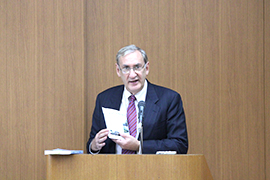- Lecturer: David Vogel (Professor, University of California, Berkeley)
- Commentator: Umezu Mitsuhiro (Associate Professor, Keio University)
- Date: Tuesday, November 19, 2013, 7:00 pm-
- Venue: Lecture Hall, International House of Japan
- Language: English (without Japanese interpretation)
- Admission: Free (reservations required)
With the increase in concern about environment issues, corporate social responsibility (CSR) activities have drawn much attention in Japan and many corporations have conducted various efforts. In this program, Dr. Vogel will give his analysis of the contemporary CSR movement citing cases in the United States and Europe as well as new developments in the CSR debate. Dr. Vogel will touch upon not only the social impact CSR activities have but also the profitability of the companies and its connection to stock holders. Additionally, Dr. Umezu Mitsuhiro of Keio University will comment on current CSR activities of Japanese companies.
David Vogel
 David Vogel is a leading authority in the area of corporate social responsibility (CSR) and business ethics in the U.S. His research focuses on business-government relations with a particular emphasis on the comparative and international dimensions of environmental and consumer regulation. His books include The Market for Virtue: The Potential and Limits of Corporate Social Responsibility (Brookings, 2005), and The Dynamics of Regulatory Change: How Globalization Affects National Regulatory Policies (UC Press, 2004).
David Vogel is a leading authority in the area of corporate social responsibility (CSR) and business ethics in the U.S. His research focuses on business-government relations with a particular emphasis on the comparative and international dimensions of environmental and consumer regulation. His books include The Market for Virtue: The Potential and Limits of Corporate Social Responsibility (Brookings, 2005), and The Dynamics of Regulatory Change: How Globalization Affects National Regulatory Policies (UC Press, 2004).
Program Report
Dr. David Vogel first reflected on CSR (Corporate Social Responsibility) activities of the past decade, pointing out that CSR has grown in importance in the past decade and that the number of companies incorporating such programs has grown. Also he clarified that one underlying motive is to respond to or avoid criticism of the corporation and so CSR goes beyond corporate philanthropy and compliance with law. Many companies incorporate CSR programs mainly to heighten brand value, maintain employee moral (“non-waged benefit”), form a corporate culture and establish good community relations surrounding their factories in developing countries as well as to anticipate government regulations. Citing cases of big global companies in the United States and Europe, Dr. Vogel explained that this has caused improvements in corporate behavior and encouraged private-sector programs to alleviate environmental and social issues. Yet he argued that there are limits in what can be expected from CSR. It is a brand image but not strong enough to change a company’s mission and alleviate environmental and social problems in a major way or to improve the profitability of companies. He challenged the argument that “doing good and making money go hand in hand.”
 In terms of CSR in Japan, he pointed out that the notion of “responsibility” is quite strong in Japanese workers and that many Japanese companies have been practicing CSR long before the term was coined. He also stated that Japanese work values may not travel so well outside of Japan when they have factories outside of Japan, though this is not a problem only for Japan, and Japanese public criticism of the behavior of domestic corporations outside of Japan is not as high as it is in western countries. Lastly he said that in order to develop a CSR program, you need to identify the company’s reputation risk and how CSR can benefit your company―CSR is not a one-size-fits-all, matter and each company has to tailor its own program thinking about its mission, resources, brand image, etc.
In terms of CSR in Japan, he pointed out that the notion of “responsibility” is quite strong in Japanese workers and that many Japanese companies have been practicing CSR long before the term was coined. He also stated that Japanese work values may not travel so well outside of Japan when they have factories outside of Japan, though this is not a problem only for Japan, and Japanese public criticism of the behavior of domestic corporations outside of Japan is not as high as it is in western countries. Lastly he said that in order to develop a CSR program, you need to identify the company’s reputation risk and how CSR can benefit your company―CSR is not a one-size-fits-all, matter and each company has to tailor its own program thinking about its mission, resources, brand image, etc.
The commentator, Dr. Umezu Mitsuhiro, touched upon the difference in how the terms “responsibility” and “ethics” are understood in the western countries and Japan, and that this may have caused some misunderstanding of CSR in Japan.